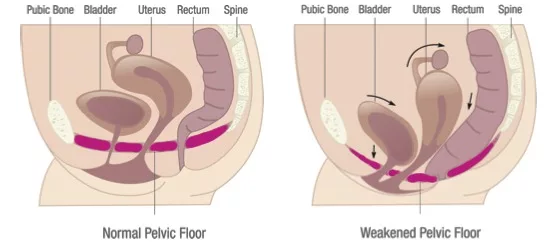By: Dr. Vivian Zhang PT, DPT, MS.
Having a baby can be one of the most joyous of times in a human’s life and the most stressful. There are a lot of decisions to be made leading up to the birth of your child including for those who get a choice, the method of delivery. Many women fear a vaginal delivery as it may lead to pelvic floor dysfunction causing them to wonder if opting for a cesarean birth may be better. However, it is a misconception that having a cesarean birth means that your pelvic floor is not affected and that you can’t experience issues such as incontinence, prolapse, pelvic pain, etc. This myth is important to debunk so that women can make educated decisions about their bodies when it comes to treating pelvic floor dysfunctions. Pregnancy alone is a risk factor for pelvic floor dysfunction no matter the method of delivery. A C-section may prevent pelvic floor dysfunction caused by complications such as obstetric instruments and vaginal tearing, but it does not mean that a woman who chooses to do a cesarean delivery will not experience pelvic floor dysfunction symptoms postpartum. In fact, 1/3 of birth patients after a cesarean delivery experience incontinence.
To gain a better understanding, let’s first think about how dysfunction in the body arises. All areas of our body consist of bones, muscles, and connective tissues. Dysfunction in the body occurs when any of these structures either at the site of injury or above and below the site of injury are compromised. The pelvic floor is just like any other area in the body and is also made up of these structures and work in conjunction with other parts of your body as a functioning system. One can still impact these structures without having a vaginal birth as pregnancy itself causes many physical changes in the body.
Pregnancy results in an increase in downward pressure for an extended period of time on the pelvic floor from your baby and increased weight gain. Keep in mind due to hormonal changes, your body also experiences a significant increase in laxity in the connective tissues. So now not only does your body have to carry more load, but everything is also a little looser. For some women, these changes are well tolerated. However, many women go into pregnancy with weak pelvic floor muscles that can’t tolerate a sudden increase in load, especially with the added laxity. This results in over-stretching of the pelvic floor muscles which then impacts the muscles’ ability to work optimally secondary to weakness and or tightness. The second reason why a woman who opts for a C-section may still experience pelvic floor dysfunction is due to the relationship between the core and the pelvic floor. The pelvic floor works in conjunction with your core to aid in pressure management within the abdominal cylinder. This is important as poor pressure regulation can lead to symptoms such as prolapse and incontinence. A C-section involves cutting through your abdominal muscles and surrounding fascia which disrupts the integrity of the muscles often resulting in weakness and poor coordination. In addition, scar tissue as a result of the surgery can also impact your abdominal muscles’ ability to do their job if not treated. Pain around the incision site can also result in increased muscle tension in your abdominals and pelvic floor as a way to guard against discomfort. Increased tension in these areas can impact the strength of your pelvic floor resulting in dysfunction.
Overall, having a C-section will not necessarily prevent you from experiencing pelvic floor dysfunction. Instead, listen to the recommendations made by your healthcare team and choose a method of delivery that is best for the health of your baby. If you do experience symptoms such as incontinence, prolapse, pelvic pain, or any other pelvic floor dysfunction postpartum seek help from your local pelvic floor physical therapist. Asking your doctor about prenatal pelvic floor physical therapy care is also a great way to prevent problems postpartum.
We’ll advise the ideal treatment tailored to your specific needs in physiologicNYC.
If you are experiencing any pelvic floor-related issues, please don’t hesitate to give us a call or reach out to our team of pelvic floor physical therapists by filling out the form below:
